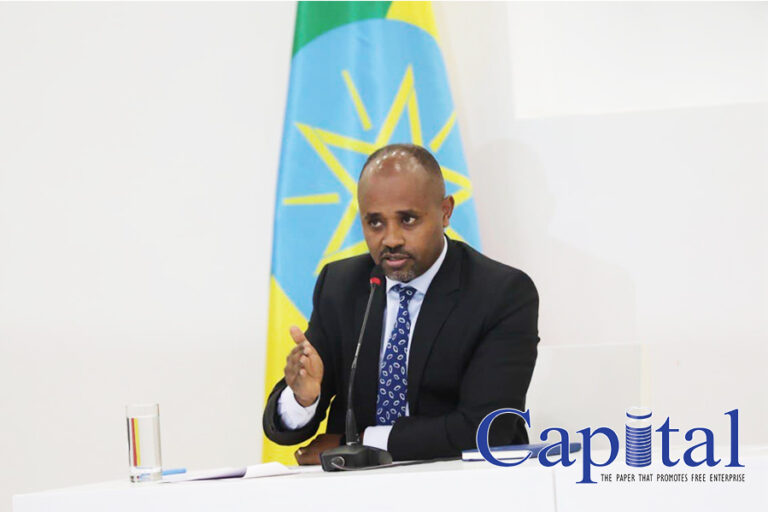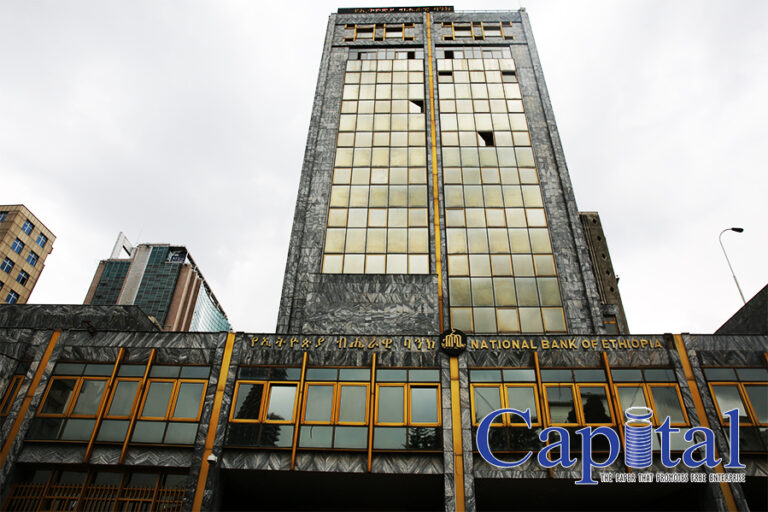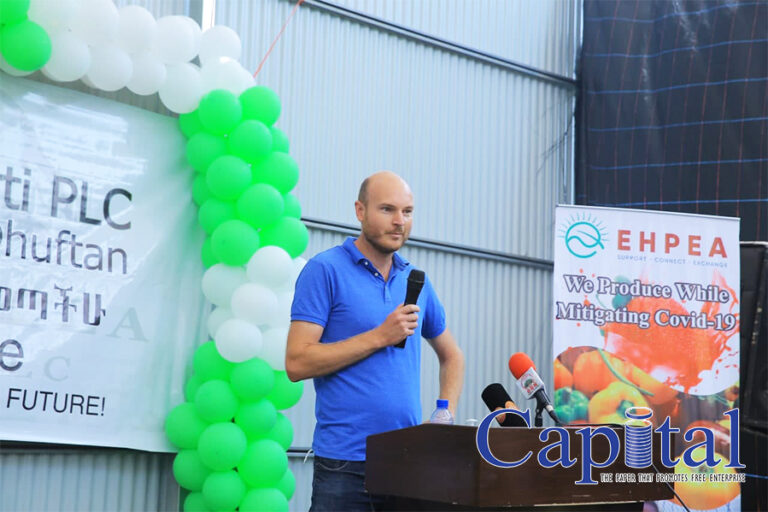The government disclosed that the country is registering massive changes in the economic sphere in the just concluded fiscal year.
The debt GDP ratio has significantly reduced in the ended fiscal year that is supported by zero non concessional loans received.
Eyob Tekalegn, State Minister of Finance, stated that more or less on the economic front the country has achieved the goals it set for the year.
He said that changes are continuing as per the past to gain the expected success as per the program that was put by the government for three years.
He said that the new government will introduce a new structure that will correct the bureaucracy and responsibility of public offices including restructuring the market on the way to cut the inflationary behavior.
He informed that the quarter century old agriculture policy is in the changing works.
On his latest meeting with media on the weekly briefing through the Office of the Prime Minister, Eyob said that the fresh loan for July had just shot up by 125 percent that made the government cautious to impose temporary restrictions on access to fresh loan under property collateral.
On his briefing, the State Minister has also stressed that despite inflation being the major macro economic challenge at the current stage, the country has registered massive achievements in this law enforcement occasion that was ignited by the terrorist, TPLF, on November 3.
The domestic revenue had registered growth for the year despite there being challenges for the year and similarly commercial banking and Development Bank of Ethiopia revenue increased by 22 percent, while insurance companies revenue climbed 16 percent, and loan and deposit increased by 33 and 30 percent, “what these high frequency data tells you is the rebound and better performance of last year, which ended on July 7, 2021.”
According to the State Minister, the lion’s share of fresh loan went to the private sector which received 70 percent consistent with the government direction of rebalancing the role of private sector on the Ethiopian economy.
He reminded that the export shows unique growth against the stagnant experience for the past decade.
“The export growth shows the very conscious and deliberate policy decision that was taken by government on the agriculture and mining fronts,” he remarked the effort of the leadership at the centre, whilst adding that, “this is not sheer luck, it came out of hard work. We have been able to remove the structural bottlenecks in the sectors.”
Agriculture productivity for the year has increased by 5.56 percent in just ten months of the past budget year, which was usually about 4.5 percent annually.
“For this success, the dry season harvest played a crucial role which registered the growth of 220.6 percent. What is phenomenal when you look at the dry season, of course you must think about irrigation which for instance recorded increase. When the year ends and we get the full data, I am sure it would be quite surprising from the money aspect,” he explained.
The dry season harvest particularly for the wheat sector was introduced about two years ago and expanded in the past budget year.
One of the successes the country retained was easing the debt distresses that are now on high risk.
He stressed that the government is continuing taking measures that would reduce the risk of debt distress, including re-profiling and restructuring of debts.
According to Eyob, the debt was rigorously maintained on a zero limit on non concessional loans which has shortly helped significantly reduce the debt to GDP ratio. As of June 2021, the figure shows that the debt GDP ratio has come down to 50 percent which is an eight percentage point decline from the June 2019 percentage points, “but very interestingly if we look at debt service to export and debt service to revenue ratio it is also improved by two to three percentage points annually in the last couple of years.”
“Again as of June 2021, debt service to export stood at 24 percent showing a reduction from 26.4 percent in 2019. This tells you that we are really on track as we’ve been saying towards our goal of meeting moderate debt distress by the end of the reform period, because export performance is the most critical variable on our debt re-profiling effort,” he elaborated.
He also stated that the country has undertaken massive changes on ease of doing business to attract FDI.
“But as we do this, we have not lost sight of addressing the structural deficiencies of the economy, and we are working to address structural deficiency in the economy, including productivity improvements across sectors and reduction of high import dependency,” the State Minister explained.
Currently, government is revising the agricultural policy after 25 years that has already been reviewed by the macro team which went to the Council of Ministers, for approval, “and we are sharpening the industrial policy tools to engender strong and broad based domestic manufacturing; in this regard the recently announced custom tariff reform had slashed the tariff rates on raw materials and intermediate goods significantly,” he explained by adding that it will be applicable at customs border rather than the past experience of passing through several government authorities to get special privilege.
The development corporation is measured by inflow, which refers to the amount of money disbursed during a given period, and commitments.
The inflow for the fiscal year actually registered USD 3.9 billion, which was 80 percent of the plan, while the commitment that was signed in the year was higher from the stated amount from the inflow and attained 90.5 percent of the projection. Of course this is also affected by the issues in relation to the law enforcement which is taking place in the northern part of the country.
Inflation, Forex and central bank
It was stated that inflation is the major macro challenge that the country is struggling with.
“We have started to take a multiple approach to tackle inflation on every front; on the monetary policy side of which some of the expansionary measures that we have taken early on the last couple of years were to mitigate the effects of COVID19 and also the cost increase due to probably domestic conflict which might have increased inflationary challenge. So the National Bank Ethiopia (NBE) this week has introduced measures to further tighten the monetary stands,” the State Minister elaborated.
“But this is our first set of measures which we must point out that NBE stands ready to utilize all available tools at its disposal to ensure price and an economic stability,” he explained.
But the critical challenge of the economy is on the supply side, so in that regard, he said that the government is addressing the supply-side challenge by enhancing productivity.
Ministry of Agriculture is now working on its actuality, not only on the ten year plan but on a one year plan, where a focus is drawn to enhance productivity across different sectors of the economy focusing on inflationary communities and in different parts of the countries, there will be more than the usual cultivating on land mantra, “to be focused targeting specific commodities that we think are contributing to food inflation.” In the short term availing some basic commodities like wheat by import will continue.
The other area the government is undertaking is focusing on the market structure.
“We are very optimistic that the new government structure will fundamentally address the market structure issue by clarifying, the mandates of government institutions and strengthening our regulatory capacity.”
The State Minister said that the government is working to come with a solution from the roots as one of a key reform measures.
The government understanding is that shock therapy and quick measures to improve the exchange rate issue has not been useful and positive in the past. The government is taking a measured approach with the rational to ensure the smooth transition through using forex supply constrain in the economy building buffers including export receipts and unwinding the expansionary fiscal and monetary policies.
“We are taking this holistically rather than focusing on shock therapy or quick wins. So reform generally has been very successful and last year, the forex market had shown promising improvement which was more than 30 percent narrowing down of the parallel market premium,” he said.
Regarding the collateralize loans that are off by NBE, it was stated as temporary measures for different and specific reasons including to correct parallel market pressures.
“But generally, when we say, there is a deliberate policy measure by the National Bank, to take a much prudent and stricter measure monetary policy stance that would have some definitely a trade off of here. For instance, if you look at the July disbursement it was about 125 percent that was at the entire year, the overall new credit has increased by 40 percent. It’s a conscious decision,” he elaborated.
He said that the government wanted to encourage private sector and also because of the COVID 19 impact, the general trend globally and also the policy measure taken was because of COVID 19. Because of that the State Minister explained that government had to take it’s our hands off the break, further highlighting that you can’t be too strict in the fiscal and monetary policy when people are dying of pandemic. But now if it has an impact of inflationary pressure, it is required to take conscious policy decisions which are taken to actually limit the economic activity.
The major macro challenge now is inflation, so for this reason, the decision by the National Bank to increase reserve requirements for banks, make a little bit expensive for banks to get access to money from the central treasury is a right decision.
He said that of course, there will be some trade-offs here, but it would be helpful in the long run.
The measures that the government had taken early on by introducing sweeping reforms on the economy is stated by the State Minister as a significant role to which the latest conflict could not make it face visible damage on the economy. The conflict might have had serious cost to the economy but did not, “for instance, when we talk about revenue performance last year it has been achieved.”
Ethiopia’s economic chronicles
NBE continues monetary policy changes
National Bank of Ethiopia (NBE) is continuing its monetary policy changes and this time around it has exempted the 30 percent of foreign currency inflows into commercial banks surrender to some sectors.
A week ago, Mamo Mihretu, Senior Advisor at the Office of the Prime Minister hinted that the government will take more tightened measures on the monetary policy to curb illegal acts and sabotages on the economy.
This week, Eyob Tekalegn, State Minister of Finance, who mentioned the latest revision on the government monetary policy, also said that the change will continue.
The latest announcement of NBE indicated that it has rendered the 30 percent surrender that banks are supposed to give for the central bank from foreign direct investment (FDI), diaspora account and other sources.
Initially, NBE introduced the 30 percent surrender in 2017 to help the government’s hard currency demand for different payments including debt service.
On the latest amendment of the ‘foreign exchange surrender requirements of banks directives no. FXD/72/2021’ NBE exempted the surrender of 30 percent of foreign currency secured from FDI and other sources stated above, while the surrender from export, remittance and NGO transfers was to continue and the percentage climbed to 50 percent.
“A bank shall surrender 50 percent of receipts only from export of goods, services, private transfer (remittance), and NGO’s transfer to the NBE every month within the first five working days of the next month,” article 3.1 of the amended directive stated.
The ‘foreign exchange inflow’ definition on the directive article 1.2 said that for the purpose of these directives, refers to foreign exchange received from export of goods, services, private transfer (remittance), and NGO’s transfer.
One of the IBD director elaborates the idea of the directive as that it is exempted banks to surrender foreign currency except the stated three sources.
He told Capital that the latest decision may help to enhance FDI and the investors who are engaging to access more foreign currency from their foreign source to bring and use it for their operation in the country. He reminded that the FDI at least should come with USD 200,000 in cash or in kind, while they expected their 30 percent to surrender to the central bank through their correspondent bank, “but now they may use it fully.”
The IBD head added that the diaspora will also be encouraged to come up with the foreign currency which will directly help the country and banks to have more foreign currency meanwhile the volume that comes from the diaspora account is very minimal and have restriction to import only prioritizes commodities as per the directive issued in March this year.
Besides the FDI and diaspora account, banks may have sources like purchase of cash and foreign currency saving as a source of foreign currency that will not be included under surrender as per the new directive.
The other amendment that NBE did this week is that foreign currency generators are allowed to use their 40 percent of the hard currency.
The ‘the retention and utilization of export earnings and inward remittances directives no. FXD/73/2021’ that amended FXD/70/2021 stated that banks are required to surrender 50 percent of the foreign currency earnings from the state three sources for NBE.
Article 4.2 of directives no. FXD/73/2021’ added that exporters of goods and services and recipients of inward remittance shall have the right to retain 40 percent of their export earnings in foreign currency indeterminately in a retention account after deduction of 50 percent surrender requirement for the total earnings, “whereas the remaining 10 percent shall be surrendered to the respective bank at the prevailing buying exchange rate immediately on the day of the receipt while the bank shall effect the payment of the equivalent birr to an eligible customer.”
Under the directive FXD/70/2021 that was issued on March, exporters of goods and services and recipients of inward remittance shall have the right to retain 31.5 percent of the total, while NBE will take the 30 percent and the balance for the commercial bank. However, in the latest directive reduced the share of banks to 10 percent on the stated foreign currency earnings sources from the previous 38.5 percent.
Similarly, on the week NBE has issued ‘investment on DBE Bonds directive no. SBB/81/2021’ that enforce banks to invest a minimum of 1 percent of their outstanding loan and advance in Development Bank of Ethiopia (DBE) Bond until the aggregated bond holding equaling 10 percent of their total outstanding loans and advances.
The DBE Bond shall have a maturity period of three years and shall pay a bond rate at least 2 percentage points higher than the minimum interest rate paid on saving deposit at the time of issuance. Currently, the minimum saving rate is 7 percent.
NBE has also announced that insurers to invest 15 percent of their net revenue on DBE Bond.
The reserve ratio of banks has also doubled from 5 percent to 10 percent and the lending facility rate has increased to 16 percent from 13 percent of the past.
Safaricom Ethiopia engages with financiers ahead of its operation
Safaricom Telecommunications Ethiopia Plc (Safaricom Ethiopia) announces that it is engaging with different financers including development partners for its investment in Ethiopia. The company has stated that it is ordering equipment and looking for the technology that it will use.
The company stated that so far the fund that it has used is mobilized from shareholders, while further finance will be secured from development partners who are currently under talks with the company as per Peter Ndegwa, Chief Executive Officer of Safaricom Plc.
Anwar Soussa, Managing Director of Safaricom Ethiopia, said that the company is expected to commence operation in the first half of 2022 and is now starting engagements with Ethio Telecom, which is expected to provide the infrastructure for the new telecom operator.
“This is going to be the next big step for us because massive important entities are going to start coming together,” he said.
He said that Safaricom Ethiopia is looking forward to engaging with top leadership of Ethio Telecom in terms of making sure that both sides build the win-win relationship, “and that can meet government’s ambitions in terms of Digital Ethiopia.”
On the first press conference that the company officials gave, the Global Partnership for Ethiopia, which includes five companies for the formation of Safaricom Ethiopia, Ndegwa expressed that the firm is proud to be investing in Ethiopia.
“Such partnerships are the building blocks of digital transformation, and I would like to thank all our partners for their support as we work towards enabling our commercial launch and contribution to digital Ethiopia as a purpose-led technology company,” said Ndegwa.
The Managing Director stated that the company has commenced recruitment of Ethiopian nationals for technology, commercial and corporate functions in various capacities ranging from executive management to graduate level opportunities.
“Our ongoing recruitment process is intentionally guided by the promise of a digital future for the people of Ethiopia. By June next year, we aim to build a team of 1000 employees driven by innovation and digital solutions. We will also offer all employees comprehensive digital training packages through our number more skill training programme a gateway to new skills in the digital economy,” he said.
Additionally, the company is set to recruit 450 graduates over the next three years into a global development programme dubbed the ‘Discover Graduate Management Programme’. The graduates will undergo accelerated learning rotations across different functions in the business as well as extensive leadership coaching and mentorship programmes.
The company has announced that over USD 300 million will be invested every year for infrastructure and technology development for the coming ten year.
Safaricom was awarded a license to operate in Ethiopia for USD 850 million spectrum fees and it disclosed that it will have a total of USD 8.5 billion investment in the coming ten years.
New greenhouse farm to blossom at Qoqa
The pioneer strawberry producer and exporting farm in Ethiopia which expanded its business with cuttings flower and automated strawberry production with fresh hands will continue on the same facility.
Starting from February this year, the former Ilan Tot strawberry farm which was transferred to the European largest ornamental producers company, EMS Flower, targets to start the ornamental cuttings export by November 2021 mainly to European markets.
On the ceremony held on Monday August 30, the new farm that is now called Zuqualla Horti Plc, leaders of the farm disclosed that the cut flower under the new greenhouse farm will be located in Qoqa, 91km south east of Addis Ababa.
The company stated that the strawberry export will also continue, while it will be transferred on the green house farming from the current open field.
In the past half year, the company had been engaged on the development of five greenhouses that have 1.1 hectares each and prepared them for cuttings production and some of them are already at the nursery stage.
Bennie Uoipers, owner of EMS Flower, told Capital that the new business so far consumes 7 million euro, while most of the finance is covered by itself and financial sources in Dutch.
Bennie told Capital that his family business in Europe mainly in Germany and the Netherlands have significant impact on the industry, “for the past four years I have observed the possibility to invest in Ethiopia which has now been realized by possessing the farm in Qoqa.”

“I decided to invest in Ethiopia because the country has good climate, very strong on the way forward and good opportunity for the future,” he said. The company has also a plan to make the farm a recreation centre by developing a visitor centre to show how it is produced. Moreover, it plans to establish restaurants and playground for children as it has in Germany, where the company’s centre is located.
At the farm that totally has 40 hectares in space, that is now called by the prominent hill at the area, Zuqualla, it is also expected to introduce a new technology on the production process that the country has never seen before in the horticulture sector that is massively introduced about a decade and half ago by the crucial initiative of Fantaye Biftu, former State Minister of Trade and Industry and experts on the investment promotion.
The company will also apply integrated pest management with beneficiary insects, who eat the bad insects, to reduce the use of pesticides.
Wout van Koppen, General Manager of Zuqualla Horti, explained that first of all, the cutting business is very labour intensive thus requires high tech, “and so if you compare the cutting business let’s say to rose farms and other cut flowers, that is a very different story.”
“The amount of labour per hectare is more. But also the techniques that we produce of which everything are on gutters and therefore we can recycle it with the ozone technique by filtering everything to reuse which is environment friendly. Therefore, we can save on our fertilizer consumption because we can use it over and over again,” the General Manger told Capital.
“The ozone technique is the first of its kind in Ethiopia that will stimulate other farms to follow it,” he added.
“The height of our green house is different in that its 6 meter that was up from 5.5 meter. The height of the green house is more stable for the climate. Moveable screen is also the other new feature on the greenhouse that allows increasing production in different weathers,” van Koppen explained.
He explained that the mother company is supplying to the European supermarkets and those supermarkets chains are getting bigger and bigger and the demand from their suppliers’ large quantities of plants but there are not so many farms or so many suppliers, who can fulfill such order quantities, “Our mother company has 200 hectare glass houses as it is very huge and still they are building every year more greenhouses. The Ethiopia facility that will produce similar product will have a share on the growing demand.”
We are already exporting strawberry, while in the first year the company targets to export 25 million cuttings. Under the plan, the company has targeted to expand the greenhouses every time at its compound.
It has also scheduled to construct greenhouse structures for the strawberry production to put it on the hydroponic scheme that allows producing up to six folds of fruits of the same area which currently operates on open field.
On the occasion of “Open Greenhouse Day” event, organized by Ethiopian Horticulture Producer Exporters Association held on Monday August 30, Tewodros Zewdie, Executive Director of the association, appreciated the decision of the company that has a huge profile in the industry to invest in Ethiopia.
At the ceremony, the farm reaffirmed that it will continue to play the corporate social responsibility and introduce different initiative to cooperate with the community in the area. So far water, electricity and other social supports have been provided for the community. “We will expand the water supply for those who are demanding and access roads will be renovated, while school will be constructed,” the General Manger said.
Currently the farm has created 380 jobs under the strawberry farm that is expected to increase to 1,200 when the cuttings business becomes operational.






